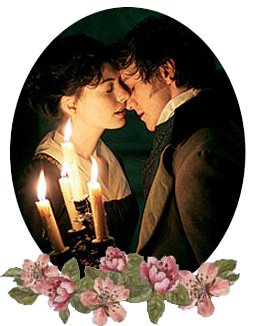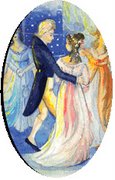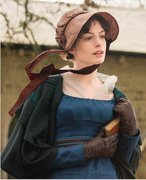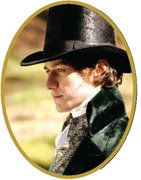I am thrilled to post on Mariana's behalf her beautiful birthday tribute to Jane Austen. Enjoy, and thank you, Mariana!

I’ve based this analysis mainly on Jane’s surviving letters and one of her wonderful and so much loved books: Sense and Sensibility - the love story of Marianne and Willoughby, but also on one of the most important information we are so fortunate to have from one of Jane’s nephews: Tom Lefroy himself confirmed “in so many words” that he indeed loved Jane Austen - reference the letter written by Thomas Edward Preston Lefroy in August 1870 to James Edward Austen Leigh
“My late venerable uncle ... said in so many words that he was in love with her, although he qualified his confession by saying it was a boyish love. As this occurred in a friendly & private conversation, I feel some doubt whether I ought to make it public.”
Once upon a December

During Christmas and New Year in 1795-96, Jane Austen met “a very gentleman like, good-looking, pleasant young man” Tom Lefroy, while he was visiting his aunt and uncle at Ashe Rectory. Tom was at that time a law student in London attending the courts at Lincoln’s Inn. He was staying with his great-uncle, Benjamin Langlois, who exerted great influence as head of the family and was paying for Tom’s education. Jane and Tom met for the first time at one of the balls that were held during that holiday season.
Michaelmas-Christmas: When the girls meet the boys
It must have been sometime after Michaelmas term (November 2nd-25th) and before Christmas, when Tom Lefroy could come for a short visit in Hampshire.
It might well be just a simple coincidence again, possible some other reasons why Jane chose not to have her heroines falling in love in the spring or summer, but it’s very interesting that almost all Jane’s books begin in the Fall/Winter and some important events take place just around Michaelmas and Christmas, followed by visits to London or Bath on the month of January-February.
As we know from one of her surviving letters, Tom did return at Ashe sometime in November 1798 and most likely again in October 1800, accompanying his father in a visit announced by Mrs Lefroy‘s letters. Strangely enough, that winter (1800-1801) Jane moved to Bath with her parents and her sister Cassandra, a chapter of her life that reminds me so much of Anne Elliot’s story in Persuasion.
In Sense and Sensibility, the Dashwoods arrived at Barton Cottage sometime in September and then “one memorable morning” around the Michaelmas, Marianne met Willoughby.
The season of happiness: Only a month

As we know from Jane’s first letter dated January 9 1796, she met Tom and danced together only at three balls till that date. They must have been spent about a month together or even less than that if will assume the first ball took place sometime around Christmas and knowing that Tom returned to London shortly after the last ball at Ashe- on January 15th.
October was the month of happiness for Marianne when the “private balls at the park” began. One morning, at the beginning of November, only few weeks later after their first meeting, Elinor and Mrs Dashwood return home to find Marianne crying and Willoughby hastily departing for London.
A Fortnight: being ‘particular’
During the 3rd ball at Manydown, after only a fortnight, Tom and Jane were openly showing their mutual attraction being partners for three successive dances: “Mr. H. began with  Elizabeth, and afterwards danced with her again; but they do not know how to be particular. I flatter myself, however, that they will profit by the three successive lessons which I have given them.”
Elizabeth, and afterwards danced with her again; but they do not know how to be particular. I flatter myself, however, that they will profit by the three successive lessons which I have given them.”
Willoughby openly and unabashedly courts Marianne, and together the two flaunt their attachment to one another: “If dancing formed the amusement of the night, they were partners for half the time; and when obliged to separate for a couple of dances, were careful to stand together and scarcely spoke a word to any body else.”
Boundaries of propriety
 Concerned that her sister is showing maybe too openly her feelings, Cassandra scolded Jane in a letter written before the 3rd ball at Manydown: “You scold me so much in the nice long letter which I have this moment received from you, that I am almost afraid to tell you how my Irish friend and I behaved. Imagine to yourself everything most profligate and shocking in the way of dancing and sitting down together <…> But as to our having ever met, except at the three last balls, I cannot say much; for he is so excessively laughed at about me at Ashe, that he is ashamed of coming to Steventon, and ran away when we called on Mrs. Lefroy a few days ago.”
Concerned that her sister is showing maybe too openly her feelings, Cassandra scolded Jane in a letter written before the 3rd ball at Manydown: “You scold me so much in the nice long letter which I have this moment received from you, that I am almost afraid to tell you how my Irish friend and I behaved. Imagine to yourself everything most profligate and shocking in the way of dancing and sitting down together <…> But as to our having ever met, except at the three last balls, I cannot say much; for he is so excessively laughed at about me at Ashe, that he is ashamed of coming to Steventon, and ran away when we called on Mrs. Lefroy a few days ago.”
The tone of this letter suggests both: defiance at being chastised and confidence in the strength of their mutual attraction. Mere convention would not limit the right conferred on her by love to act however she chose, just as it would not for Marianne.
Elinor also wished their attachment was less openly shown “and once or twice did venture to suggest the propriety of some self-command to Marianne. But Marianne abhorred all concealment where no real disgrace could attend unreserved; Willoughby thought the same; and their behaviour at all times, was an illustration of their opinions… Such conduct made them of course most exceedingly laughed at;”
Marriage expectations

Jane herself was expecting Tom Lefroy to make her an offer, as she communicated her feelings to Cassandra in the second letter (January 14-16, 1796): “Our party to Ashe to-morrow night will consist of Edward Cooper, James (for a ball is nothing without him), Buller, who is now staying with us, and I. I look forward with great impatience to it, as I rather expect to receive an offer from my friend in the course of the evening.”
I know there are other opinions about this offer being merely an invitation at dance and not a marriage proposal, but I am inclined (by my sense, not just sensibility) to believe that Jane, although very fond of dancing, would not look forward and communicate it to her sister with such “great impatience” if she only expected a country dance for their last night together.
Mrs. Dashwood and Elinor also feel that Willoughby will propose to Marianne at any moment. Their hopes are dashed, however, after they find Marianne in tears and Willoughby departing for London.
Farewell: His departure to London

Soon after the last ball, possible right the next day, Tom Lefroy departed Ashe to return to London. One of Jane’s nieces, Caroline Austen, believed that Mrs Lefroy took it upon herself to separate Tom and Jane: “Mrs. Lefroy sent the gentleman off at the end of a very few weeks, that no more mischief might be done.”
If they were indeed separated by Mrs Lefroy or some other Tom’s relatives (I rather suspect his great-uncle, Benjamin Langlois, who perhaps had other views for him) concerned with their love affair, we may never know, but Willoughby’s departure to London (same as Mr Bingley’s in P&P) is once again an interesting coincidence.
On the very day when the Dashwoods were expecting Marianne to receive “an offer” from Willoughby, he is suddenly announces that must depart for London on business, leaving Marianne lovesick and miserable. “Mrs. Smith has this morning exercised the privilege of riches upon a poor dependent cousin, by sending me on business to London. I have just received my dispatches, and taken my farewell of Allenham; [Ashe?] and by way of exhilaration I am now come to take my farewell of you.”
“A boyish love”
 Jane’s sister was expected home few days after Tom’s departure. Cassandra was staying with her fiancé's family in Berkshire that month and so she most likely received an account of what had happened when she return at Steventon. Was there a secret engagement? Did Jane feel like Marianne “to be as solemnly engaged to him, as if the strictest legal covenant had bound us to each other”?
Jane’s sister was expected home few days after Tom’s departure. Cassandra was staying with her fiancé's family in Berkshire that month and so she most likely received an account of what had happened when she return at Steventon. Was there a secret engagement? Did Jane feel like Marianne “to be as solemnly engaged to him, as if the strictest legal covenant had bound us to each other”?
“This is what I believe to have happened” said Mrs Dashwood after Willoughby’s hastily departure, and I will second her with some extracts from the book:
“I am persuaded that Mrs. Smith suspects his regard for Marianne, disapproves of it, (perhaps because she has other views for him,) and on that account is eager to get him away;— and that the business which she sends him  off to transact is invented as an excuse to dismiss him. This is what I believe to have happened.”
off to transact is invented as an excuse to dismiss him. This is what I believe to have happened.”
“I want no proof of their affection,” said Elinor; “but of their engagement I do.”
“I am perfectly satisfied of both.”
“Yet not a syllable has been said to you on the subject, by either of them.”
“I have not wanted syllables where actions have spoken so plainly. Has not his behaviour to Marianne and to all of us, for at least the last fortnight, declared that he loved and considered her as his future wife, and that he felt for us the attachment of the nearest relation?”
“Before the house-maid had lit their fire the next day, or the sun gained any power over a cold, gloomy morning in January [based on Ellen Moody’s calendar: Wednesday 17 January 1798 http://www.jimandellen.org/austen/s&s.calendar.html ], Marianne, only half dressed, was kneeling against one of the window-seats for the sake of all the little light she could command from it, and writing as fast as a continual flow of tears would permit her.”
“Engagement!” cried Marianne, “there has been no engagement.”
“No engagement!”
“No, he is not so unworthy as you believe him. He has broken no faith with me.”
 “But he told you that he loved you.”—
“But he told you that he loved you.”—
“Yes—no—never absolutely. It was every day implied, but never professedly declared. Sometimes I thought it had been—but it never was.”
“I felt myself,” she added, “to be as solemnly engaged to him, as if the strictest legal covenant had bound us to each other.”
“I can believe it,” said Elinor; “but unfortunately he did not feel the same.”
“He did feel the same, Elinor—for weeks and weeks he felt it. I know he did. Whatever may have changed him now, (and nothing but the blackest art employed against me can have done it), I was once as dear to him as my own soul could wish.
We will never know for sure what happened between Jane and Tom that winter or in the years that followed, as there are no surviving letters to shed a light, but I think Jane left us some ‘bread crumbs” in all her wonderful books and as Jane’s niece Anna Austen Lefroy said in one of her letters: “The one thing certain is, that to the last year of his [Tom Lefroy] life she [Jane Austen] was remembered as the object of his youthful admiration”
Here’s a link to one of my favourite Becoming Jane fan-videos, which I think will be a nice gift-wrapping for my analysis:
Once Upon a December - A Becoming Jane Music Video
http://www.youtube.com/watch?v=8A5ZRvFe1_0
Pic 1: Jane Austen from: Images
Pic 2: Anne Hathaway as Jane Austen from: Guardian
Pic 3: Anne Hathaway and James McAvoy from: Collider
Pic 4: Sense & Sensibility from: lilycup
Pic 5: Elinor and Marianne from: Jim And Ellen
Pic 6: Sense & Sensibility from: lilycup
Pic 7: James McAvoy and Anne Hathaway from: smh
Pic 8: Sense & Sensibility from: lilycup
Pic 9: Kate Winslet as Marianne from: Photobucket
Pic 10: Sense & Sensibility from: lilycup
 This week, the last weekend of 2008, I’d like to pick something from my favourite book ‘Persuasion’ about the inner strength of a woman. No, I’m not talking of Anne Elliot, though she was one mighty woman of her own. This quote is about her friend, Mrs. Smith, who used to be a rather wealthy woman but by the time of Anne’s visit to her humble quarters in Bath, she had become an ill woman of barely any means to live on. As we all know, Jane was very sick when she wrote the last chapters of ‘Persuasion’, and I think she channelled her strength through her descriptions of Mrs. Smith. Yes, I do think that Mrs. Smith resembles Jane Austen in her later days.
This week, the last weekend of 2008, I’d like to pick something from my favourite book ‘Persuasion’ about the inner strength of a woman. No, I’m not talking of Anne Elliot, though she was one mighty woman of her own. This quote is about her friend, Mrs. Smith, who used to be a rather wealthy woman but by the time of Anne’s visit to her humble quarters in Bath, she had become an ill woman of barely any means to live on. As we all know, Jane was very sick when she wrote the last chapters of ‘Persuasion’, and I think she channelled her strength through her descriptions of Mrs. Smith. Yes, I do think that Mrs. Smith resembles Jane Austen in her later days.

 Pic:
Pic: 











































































